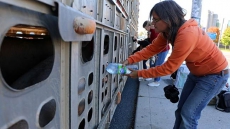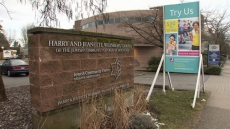TORONTO — Coffee shops and automated bank machines would make ideal locations for installing automated external defibrillators to help people who have collapsed following a cardiac arrest, researchers suggest.
In a study published Monday in the American Heart Association journal Circulation, an engineering team at the University of Toronto identified all businesses with 20 or more locations in Canada's largest city, then mapped where cardiac arrests had occurred within 100 metres of those spots between 2007 and 2015.
Cardiac arrest causes the heart to suddenly stop beating due to an electrical problem and is considered a medical emergency. Responding quickly to restart the heart with a defibrillator can mean the difference between life and death. So, it's important to give bystanders quick access to an automated external defibrillator, or AED, the researchers say.
The researchers came up with a top-10 list of prime locations to place AEDs, which provide a bystander with visual and audio instructions for delivering a shock that can restart the heart before paramedics arrive.
Those locations include Tim Hortons, Starbucks and Second Cup coffee shops; ATMs for the country's largest banks; Subway sandwich shops; and Green P public parking lots.
Tim Hortons, with more than 300 outlets in Toronto, was ranked first. Chan said these locations alone would have provided AED coverage for more than 200 of the roughly 2,600 out-of-hospital cardiac arrests that occurred in the city during the eight-year period.
"The key is we're trying to create maybe an unconscious association for the potential bystander to a cardiac arrest," said principal researcher Timothy Chan, director of the Centre for Healthcare Engineering at the university.
"So it's an emergency situation, someone collapses and you need to go find an AED. Are you going to be able to figure out where the closest one is? Or is it just easier to think 'Hey, where's the closest Tim Hortons or the closest RBC (Royal Bank of Canada)?" he said in an interview Monday.
"Maybe it would be much easier for someone in this emergency state, not thinking clearly, to just make the association and then go and grab an AED."
There are about 40,000 cardiac arrests in Canada each year, with up to 85 per cent occurring in public places or at home, according to the Heart and Stroke Foundation. It's estimated that less than one in 10 people who have a cardiac arrest outside a hospital survive.
Co-author Christopher Sun, a PhD student in the faculty of applied science and engineering, said previous research on AED placement had focused on broadly defined location categories, such as shopping malls or office buildings.
But these categories generalize many individual businesses, which have different activities and hours of operation, and they might miss critical insight as to which locations are high-risk spots for cardiac arrests.
"So we wanted to get more specific: (at) which individual locations or businesses could AEDs be placed to make sure they are accessible to the largest number of people throughout the day?” Sun said.
“What we found really interesting is that ATMs, as opposed to the more traditional businesses, are often standalone or outdoors and are often available 24/7," he said. "They're also universally recognizable and already have an electronic and security infrastructure — hypothetically, if we were to have AEDs paired with ATMs, it would be very beneficial.”
AEDs are typically located in airports, sports arenas, athletic facilities, convention centres and in some shopping malls. But Chan said health organizations, foundations and policy-makers looking to expand public-access defibrillator programs could use the study's rankings to identify businesses that could become partners in placing the life-saving devices.
"Ultimately, we want to get AEDs in the right locations, so they are accessible when needed most," he said, adding that researchers in other cities could follow their method to map their own top-10 locations.
In an accompanying editorial, doctors Michael Field and Richard Page of the University of Wisconsin School of Medicine and Public Health commended the Toronto researchers for their "important work."
"We see this as a call to action for communities and heart disease advocacy groups to explore public/commercial collaboration to enhance rational AED placement throughout areas of population density," they write.
Cardiac arrest "remains a major public health problem that can be addressed by an AED that is both nearby and available to use. Future efforts should be committed to ensuring that an AED is in the right place at the right time."





